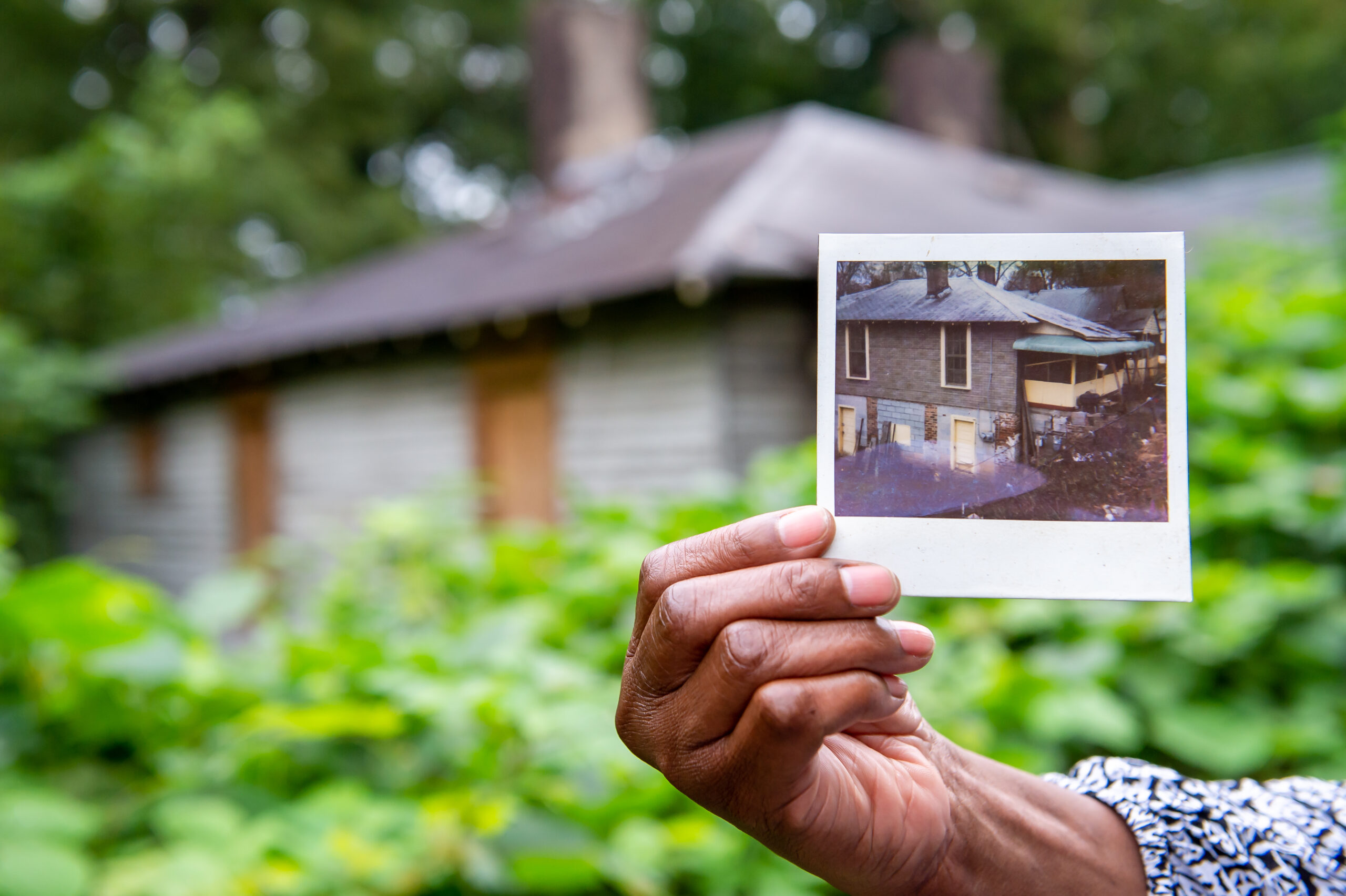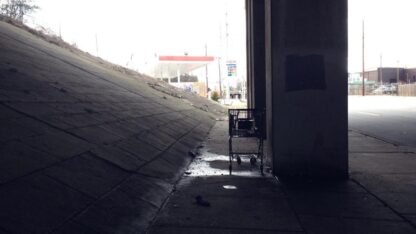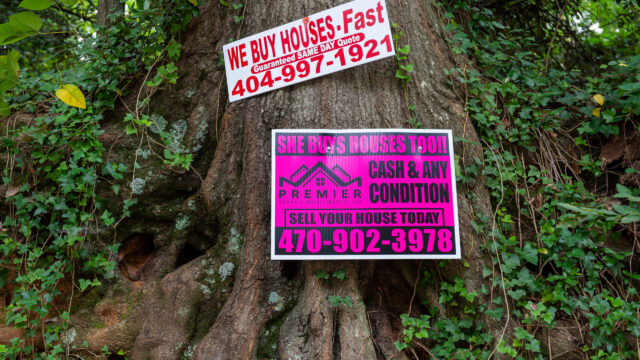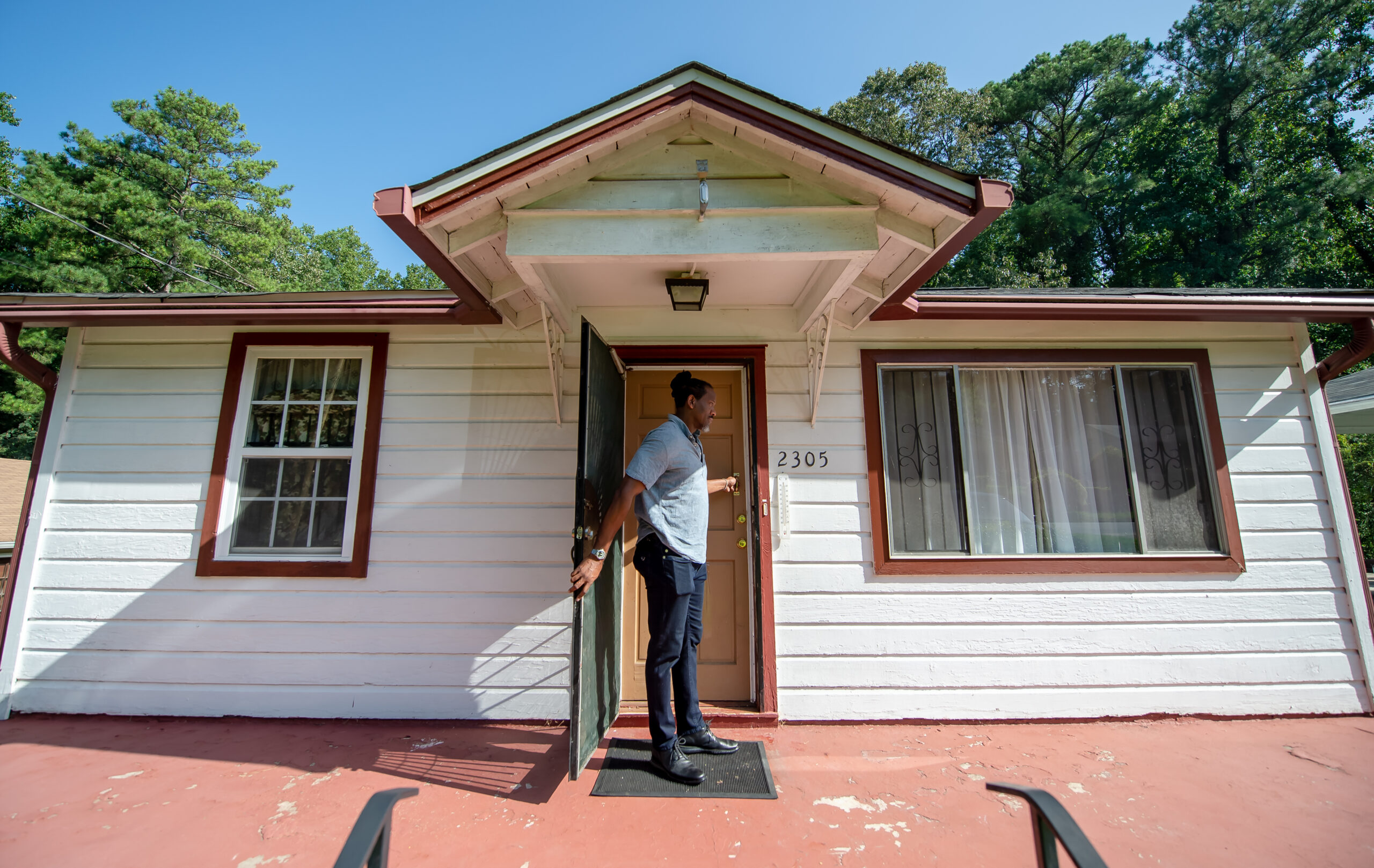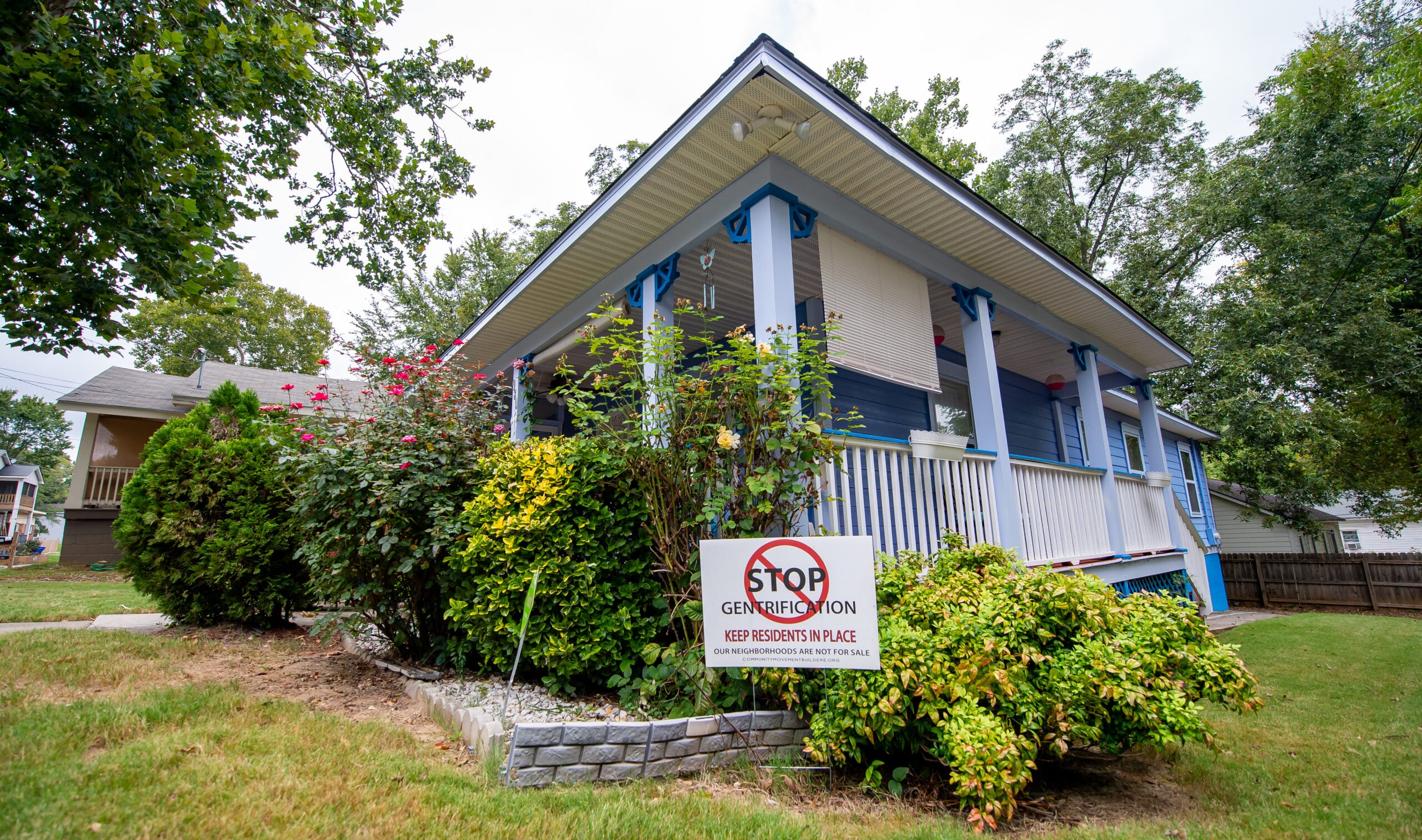Annie Kate Walls kept visiting her old house in the months after she moved.
She’d drive to this street in Atlanta’s Pittsburgh neighborhood, a couple miles southwest of downtown, and she checked on the outdoor cats she used to feed.
“That’s the hurting part about it,” Walls said. “I’ve always been an animal lover.”
Walls said her family lived on this block for 45 years. It was peaceful. She didn’t just keep pets. In the early days, her dad maintained a garden. In an old photo she holds, her dad poses with a shovel among rows of collards and turnips. He’s wearing a tie. His smile looks proud.
In the years that followed, her dad died. She watched squatters and drug dealers take over the neighboring house. And her own home started to deteriorate. But Walls said she and her husband still kept to themselves. She took care of dogs inside and watched over the cats on her street.
She said she never had a problem until the home next door to her was renovated.
Her former neighborhood is one of several in south and west Atlanta that has seen new investment, development and residents in recent years. And as Walls learned, that does not come without consequences for the people who lived in these areas before.

Homeowners, in particular, have faced intense demand for their houses and land, often for extremely low prices. A WABE and APM Reports analysis found the effects were most acute in Pittsburgh. More than 40 percent of homes, sold by homeowners who lived in them, sold for prices so low, they were less than half the Zestimate from Zillow. That held true even when measuring sales prices against the Fulton County Tax Assessor’s estimate of fair market value.
It’s generally assumed that the pressures to sell come from outside investors, sending fliers and texts offering cash for properties. But in Walls’ case, the pressures came from within the neighborhood itself.
“It’s this idea of feeling like they are being pushed out. They are no longer the desired citizen in Atlanta.”
Brittney Martin, attorney with the city’s public defender’s office
She started receiving complaints. The first ones came from code enforcement, which keeps calls anonymous. An officer came to her house. According to the notice, the inspector wrote her up for nine violations, including a damaged roof, decaying siding and chipped window frames.
Walls said she knew the home needed repairs but she couldn’t afford them. She injured her hand and no longer could continue her job at a paper bindery. Only her husband was working.
It didn’t matter. The city sent her to court.
“It hurt me real bad because I couldn’t do nothing,” she said. “No money.”

And those weren’t the only complaints. Next, she heard from animal control. The records, provided by Fulton County, show her new neighbor next door called. The neighbor declined to speak for this story.
According to the complaints, the caller asked animal control to check on dogs “that are not being taken care of.” The county officer visited Walls and reported that it found two dogs “in good condition.” Animal control told Walls to cut her dogs’ nails and then worked with her to spay and neuter the outdoor cats.
But even as that was underway, the animal control complaints continued.
“Every time I turn around, here come animal control,” Walls said.
There were three complaints total. In the third, the neighbor called concerned about cages in the yard with towels over them. The nonprofit Pets for Life had set up the cages in order to catch and then fix the cats outside.
Walls was already overwhelmed. She said the animal complaints got to her.
“They act like I’m some kind of criminal; like I had done something to somebody,” Walls said. “And I was trying to live. So I said I’m just fed up. I got to go.”
She had been receiving fliers in the mail asking to buy her property for cash, so she pulled one out. She prayed she picked the right one. Then she called the number.
And like that, Walls gave up the house her family-owned for decades.
“It was heartbreaking for me,” said Brittney Martin, an attorney with the city’s public defender’s office, who represented Walls in code enforcement court during this time. “Once I even heard the number that she sold the property for–I’m just like, man.”
Walls accepted $30,000 for her home. Investors resold it for double in the same condition.
“No one pays $200,000 plus for a home to be next door to rats, roaches, possums, and all of these things that are unhealthy and unsanitized.”
Devon Holloway, president of the group Pittsburgh ATL Homeowners United
In court hearings, Martin said she sees the frustration that Walls felt from other longtime homeowners in gentrifying neighborhoods. Before a judge, they have to address issues that previously weren’t considered issues.
“You know, no one’s cared about my car being parked here in the last 15-20 years,” Martin said. “No one’s cared about my home needing a paint job in the past 10 to 15 years. But because I’m in Pittsburgh, or in one of these areas that is turning, now all eyes are on my property.”
She said it’s not that the homeowners aren’t genuinely in violation of the code. It’s that no one warns them that their chipped paint or failing roof will become a problem, or proactively offers them help. Code enforcement just shows up for a housing violation that can carry jail time.
Martin said the city code can feel like a weapon against these homeowners.
“They see their city changing. They see all of what’s happening,” she said. “And so I think it’s this idea of feeling like they are being pushed out. They are no longer the desired citizen in Atlanta.”
The WABE and APM Reports analysis of real estate records showed homeowners selling for low values is not unique to Pittsburgh. In three other neighborhoods, Grove Park, Venetian Hills and Sylvan hills, more than one in four owner-occupied properties, which sold between 2015 and 2018, also sold for prices that were less than half the Zestimate. Using the Fulton County Tax Assessor’s appraisals as an estimate of fair market value yielded similar results.
The findings don’t surprise Martin. She said homeowners in these neighborhoods likely accept the low offers because it’s a relief from the stress they’re experiencing.

Devon Holloway, president of the group Pittsburgh ATL Homeowners United, said the issue doesn’t start with code inspections or animal welfare checks. It starts with years of property owners not taking responsibility.
“It’s all about being a good neighbor, and respecting your neighbor,” he said
He looks out on his block in the Pittsburgh neighborhood. He bought his home here several years ago. It’s renovated with a landscaped yard.
But across the street are still vacant homes. Weeds take over a lot. Holloway said these are issues of public safety. And they’ve held neighborhoods, like Pittsburgh, back.
“No one pays $200,000 plus for a home to be next door to rats, roaches, possums, and all of these things that are unhealthy and unsanitized,” he said, “because that’s a problem.”
Holloway said the city allowed these problems in Pittsburgh and the southside of Atlanta for decades. Now he said it needs to stop. The homeowners’ association he formed pushes the city and county to enforce public safety, housing code and animal control.
“It’s simple: comply with the law,” Holloway said. “And if you don’t know, ask questions.”
He said homeowners can request help if they’re not in the best financial situation to bring their houses up to code. Some nonprofits do repairs for free.
The problem according to the city’s public defender’s office is that funds are limited and often only available to seniors. That can mean older than 55. Walls, who was about 60 at the time, said she believed she had to be 62, which also can be true for certain programs.

Code enforcement didn’t have much to say about her case other than that her property was in violation. It didn’t matter who called in the complaint or what else was going on in the neighborhood. She had 60 days to comply.
More than a year later, her former home has only deteriorated further. The investor who owns it still hasn’t fixed up the house. It is boarded and surrounded by a wall of kudzu.
But in the time that’s passed, Walls has changed. She now wonders if the trouble she went through happened for a reason. Maybe it was time for her to leave Pittsburgh, she said.
“Sometime they say it’s a blessing in disguise,” Walls said.

She and her husband bought a mobile home down in Rex, Georgia. And it turns out, they like it there. She said it’s quiet and the neighbors mind their business. There are cats and dogs everywhere.
It’s been a while now since she’s been back to see the cats here in Pittsburgh. So, when she spots them during the interview on her old street, she stops and heads to her car. She brought them food.
She pours it in a bowl. The two cats, who she’s named Michelle and Little Boy, run up to meet her. They brush against her hand. While Walls talks to them, she starts to cry.
“Hey baby, miss me? I do too. I miss you.”
This story was possible with support from America Amplified, a public media initiative, and the Corporation for Public Broadcasting. It was produced in collaboration with APM Reports, the investigative reporting unit of American Public Media.
